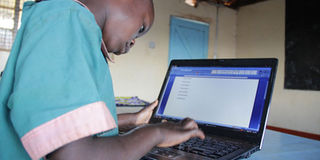Government awards laptop tender to Olive Telecom of India

Diana Wanjiku of Thunguma primary school in Nyeri using a laptop on June 13, 2013. FILE PHOTO | JOSEPH KANYI |
What you need to know:
- India’s Olive Telecommunication Limited was followed by Hewlett Packard with a Sh25 billion bid
- The company is expected to provide 1,203,539 laptops, 20,637 printers and 20,637 projectors
The tender for the supply of laptops for schools has been awarded to Olive Telecommunication Pvt limited at a price of Sh24.6 billion.
Education Cabinet Secretary Jacob Kaimenyi on Friday said the bidder quoted the “lowest and most advantageous amount” which saved the taxpayers Sh8 billion.
India’s Olive Telecommunication Limited was followed by Hewlett Packard with a Sh25 billion bid, with China's Haier Electrical Limited third with a Sh27 billion quote.
A total of 16 companies had submitted their tenders. (READ: Supplier of laptops to be named this week)
“In December last year, we engaged in competitive negotiations with the bidders and asked them to provide the best and final offer. After conducting a due diligence exercise on the bidders, Olive Telecommunications was the lowest bidder at a total price of Sh24,687,360,” Prof Kaimenyi told a press conference at his offices on Friday.
He said part of the due diligence was looking at the previous supplies that the laptop manufacturer’s company had done.
The Ministry of Education also sent a team of eight government technocrats to China and India to assess Olive Telecommunication Limited. Part of the due diligence was to assess where Olive’s laptops would be assembled.
“They showed us the companies they have supplied with laptops, we are sure they will deliver. We picked them using a competitive negotiations approach which is a recognized world class procurement practice,” said Prof Kaimenyi.
QUESTIONED TENDER
Some vendors have however released documents questioning the ability of the lowest bidder.
The Nation could not verify some of the claims made. An Olive Telecom director, Arun Khanna, dismissed claims that his firm lacked capacity to deliver.
He said the firm was a multi-billion-dollar establishment capable of delivering the laptops.
Last week, the Nation met two agents of Haire Electrical Limited, which has questioned the tender in a letter to the Education Ministry.
The officials, who visited the Nation but refused to be photographed, denied they were behind circulation of the discrediting information.
The company is expected to provide 1,203,539 laptops, 20,637 printers and 20,637 projectors for learning in public primary schools. An additional 20,637 laptops will be for the teachers.
According to the Principal Secretary for Education Dr Belio Kipsang, the Sh24.6 billion has covered the whole cost of production and distribution to the district headquarters where the primary schools will collect them.
“The laptops will be brought in batches as they are being manufactured since there is no company that can manufacture more than 400,000 laptops per month,” he said, adding: “By the end of first quarter this year, all the pupils will have the laptops.”
The Ministry of Education in October 2013 cancelled the laptop tender bids as the total cost of the laptops by the lowest evaluated bidder was Sh32 billion against a government budget of Sh12 billion.
Previously, HP Commercial was the lowest bidder quoting Sh32 billion, with a unit price of Sh23,000 which is almost double what the government had budgeted for.
Haier Technologies had quoted Sh34 billion, it has now quoted Sh26 billion.
A Chinese company, Huawei PTE Ltd, was the highest, quoting Sh60.5 billion.
MASTER TRAINERS
Also in October 2013, the Ministry of Education trained 150 master trainers at Kenya Education Management Institute.
“The master trainers will in turn train 3,000 trainers of trainers, who by the time the laptops are delivered to the schools, we will have trained over 60,000 teachers,” said Dr Kipsang.
Three teachers would then be distributed to each of the 20,000 public primary schools in the country.
Dr Kipsang said that the Rural Electrification Authority had connected 11,000 out of the total 20,000 eligible primary school with power.
Another 4,000 schools will be connected by end of June, 2014. (READ: Laptops face hitch in rural schools due to lack of power and trained teachers)
“We are in talks with the Ministry of Energy and the Treasury to give additional funds so that we can have more school connected with electricity. By the time we are rolling out the laptops, 60 percent of the 20,000 schools will be connected with electricity. The remaining 40 per cent will use solar power,” he said.
The Kenya Institute of Curriculum Development has developed digital content for all classes in primary schools and digitised content in seven subjects for Class One to Three.





